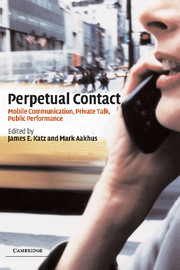Book contents
- Frontmatter
- Contents
- List of figures
- List of tables
- Notes on the contributors
- Preface and acknowledgments
- 1 Introduction: framing the issues
- PART I Mobile communication: national and comparative perspectives
- PART II Private talk: interpersonal relations and micro-behavior
- PART III Public performance: social groups and structures
- Appendixes
- Index
PART I - Mobile communication: national and comparative perspectives
Published online by Cambridge University Press: 22 September 2009
- Frontmatter
- Contents
- List of figures
- List of tables
- Notes on the contributors
- Preface and acknowledgments
- 1 Introduction: framing the issues
- PART I Mobile communication: national and comparative perspectives
- PART II Private talk: interpersonal relations and micro-behavior
- PART III Public performance: social groups and structures
- Appendixes
- Index
Summary
Hundreds of millions of people worldwide are enthusiastically embracing mobile digital communication. In this part, we explore through the lens of national cultures the social scientific and communication issues that arise from this process. Authors representing eight countries provide information and interpretation of this process; they tell us what is happening in their countries and some possible reasons why. We present the chapters in roughly the order of penetration of mobile phones at the beginning of the millennium. Pride of place goes to Finland.
The nations examined range from those that have more mobile phone than wireline subscribers (Israel) to those in which mobile phone subscription is a rarity, costing several times the average monthly wage (Bulgaria). The respective national situations represented among the chapters are variegated in terms of cultural practices, economic development and geography. Mobile phone practices also vary somewhat among these nations. But what is perhaps even more striking is the way denizens of these national cultures, despite their respective uniqueness, nonetheless often converge on a common set of mobile phone practices, give voice to a common set of social conduct concerns and find themselves grappling with comparable negotiations of time, space and identity. These nation studies yield a snapshot of the emerging contested domains of local culture, family control and the new low-level uses and abuse of public and private places.
- Type
- Chapter
- Information
- Perpetual ContactMobile Communication, Private Talk, Public Performance, pp. 15 - 18Publisher: Cambridge University PressPrint publication year: 2002
- 1
- Cited by



